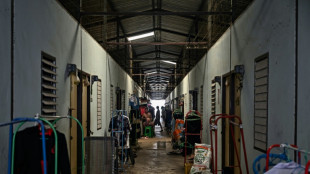-
 EU vows firm response if Trump unleashes tariffs
EU vows firm response if Trump unleashes tariffs
-
Trump says tariff 'pain' will be 'worth the price'

-
 Global warming makes French reservoir a winter resort for migrating cranes
Global warming makes French reservoir a winter resort for migrating cranes
-
China shrugs off new Trump tariffs but bruising trade war looms

-
 Is it Beyonce's time? Music's A-listers ready for the Grammys
Is it Beyonce's time? Music's A-listers ready for the Grammys
-
Chappell Roan: the splashy pop supernova

-
 Trump unveils sweeping US tariffs on Canada, Mexico, China
Trump unveils sweeping US tariffs on Canada, Mexico, China
-
US unveils sweeping tariffs on Canada, Mexico, China

-
 Ex-Charlie Hebdo artist wins top prize at comics festival
Ex-Charlie Hebdo artist wins top prize at comics festival
-
Trump tariff deadline looms, Canada told levies coming Tuesday

-
 Trump tariff deadline looms over Canada, Mexico, China trade
Trump tariff deadline looms over Canada, Mexico, China trade
-
Horst Koehler, German ex-president and IMF chief, dead at 81

-
 Pre-Grammys gala honoring the Grateful Dead focuses on fire relief
Pre-Grammys gala honoring the Grateful Dead focuses on fire relief
-
Tradition and technology sync at China 'AI temple fair'

-
 Taliban govt-run corporation takes over luxury Kabul Serena hotel
Taliban govt-run corporation takes over luxury Kabul Serena hotel
-
Benin seeks home-grown cotton 'revolution'

-
 A 'city-killer' asteroid might hit Earth -- how worried should we be?
A 'city-killer' asteroid might hit Earth -- how worried should we be?
-
Philadelphia plane crash marks a second US aviation disaster

-
 OpenAI chief says it needs new open-source strategy
OpenAI chief says it needs new open-source strategy
-
Neymar signs for Santos

-
 US charges former Fed official with spying for China
US charges former Fed official with spying for China
-
Meta mulling incorporation shift to Texas: report

-
 Scientists cast doubt on famous US groundhog's weather forecasts
Scientists cast doubt on famous US groundhog's weather forecasts
-
World's longest cargo sail ship launched in Turkey

-
 TikTok king Khaby Lame joins UNICEF as goodwill ambassador
TikTok king Khaby Lame joins UNICEF as goodwill ambassador
-
Stock markets mostly gain at end of turbulent week

-
 Stock markets gain at end of turbulent week
Stock markets gain at end of turbulent week
-
Calls for UK govt to allow bird flu vaccines for poultry

-
 Offshore wind power giant Orsted changes CEO
Offshore wind power giant Orsted changes CEO
-
South Korea, Ireland watchdogs to question DeepSeek on user data

-
 Trio of rare tiger cubs spotted in Thai national park
Trio of rare tiger cubs spotted in Thai national park
-
Stock markets close out turbulent week with gains

-
 South Korea watchdog to question DeepSeek over user data
South Korea watchdog to question DeepSeek over user data
-
Kenya's Ice Lions skate to win on East Africa's only rink

-
 World awaits Trump tariff deadline on Canada, Mexico and China
World awaits Trump tariff deadline on Canada, Mexico and China
-
Samsung operating profit hit by R&D spending, fight to meet chip demand

-
 Japan records biggest jump in foreign workers
Japan records biggest jump in foreign workers
-
Asian markets mostly rise but worries over tariffs, AI linger,

-
 Investigators recover plane black boxes from Washington air collision
Investigators recover plane black boxes from Washington air collision
-
'No happiness': Misery for Myanmar exiles four years on from coup

-
 Ghosts of past spies haunt London underground tunnels
Ghosts of past spies haunt London underground tunnels
-
Chipmaker Intel beats revenue expectations amidst Q4 loss

-
 Key nominees for the Grammy Awards
Key nominees for the Grammy Awards
-
Beyonce leads Grammys pack at gala backdropped by fires

-
 Samsung Electronics posts 129.85% jump in Q4 operating profit
Samsung Electronics posts 129.85% jump in Q4 operating profit
-
French luxury billionaire sparks tax debate with threat to leave

-
 Apple profit climbs but sales miss expectations
Apple profit climbs but sales miss expectations
-
Washington midair crash: What we know so far

-
 Marianne Faithfull: from muse to master
Marianne Faithfull: from muse to master
-
Trump blames 'diversity' for deadly Washington airliner collision

| CMSC | -0.89% | 23.47 | $ | |
| SCS | -1.39% | 11.48 | $ | |
| CMSD | -1.59% | 23.84 | $ | |
| NGG | -0.55% | 61.4 | $ | |
| AZN | -0.68% | 70.76 | $ | |
| RBGPF | 100% | 67.27 | $ | |
| RELX | -0.92% | 49.89 | $ | |
| GSK | -0.26% | 35.27 | $ | |
| RYCEF | -0.81% | 7.43 | $ | |
| BTI | -0.1% | 39.64 | $ | |
| BCC | -1.98% | 126.16 | $ | |
| RIO | -0.83% | 60.41 | $ | |
| BP | -1.77% | 31.06 | $ | |
| BCE | -0.46% | 23.79 | $ | |
| VOD | -0.82% | 8.54 | $ | |
| JRI | -0.32% | 12.53 | $ |
Asylum seekers: Return centres – a Solution?
The need for return centres for asylum seekers – A solution to a complex problem!
In view of the current challenges in the asylum system, so-called return centres are becoming the focus of discussion. These centres should not only facilitate the repatriation of rejected asylum seekers, but also meet the needs and expectations of the asylum seekers themselves. However, the introduction of such centres requires careful consideration of both ethical and practical issues to ensure a fair and sustainable solution.
Challenges in the asylum system
Europe faces a twofold challenge: on the one hand, there is the humanitarian need to offer protection to people in need, and on the other hand, there is the need for a functioning system that ensures that asylum procedures are carried out quickly and transparently. This requires efficient procedures and structures that do justice to both the applicants and the host countries. An important instrument could be the establishment of return centres. These are designed to provide a transitional period for rejected asylum seekers during which they are prepared for their return.
What are return centres?
Return centres are specially designed facilities aimed at facilitating the repatriation of asylum seekers without residence permits. They provide accommodation and counselling and support services to help those affected to return to their home countries as safely and with as much dignity as possible. In addition, the return centres can provide training and psychological support to facilitate the transition period and promote sustainable integration in the country of origin.
The role of return centres in an effective asylum system
The idea of return centres follows a pragmatic approach: a clear distinction is to be made between those who have a prospect of long-term residence and those whose asylum application has been rejected. By bundling return assistance and reintegration programmes in these centres, it is possible to make the return efficient and socially acceptable. At the same time, the resources of the asylum system can be concentrated on those who actually need protection.
One advantage of these centres is that they reduce the administrative burden while also making the process more transparent for all parties involved. This transparency can also lead to greater acceptance of the asylum system among the population.
Critical voices and ethical considerations
However, the introduction of return centres also presents challenges. Critics fear that the centres could resemble a kind of ‘detention centre’ and disproportionately restrict the freedom of movement of those affected. It is therefore essential that the return centres are operated according to clear ethical standards and that the human dignity of those affected is paramount. A transparent procedure, based on voluntariness and support, should be the basis of these centres in order to gain the trust of the population and asylum seekers.
Return centres as an opportunity for a fairer asylum system
If return centres are embedded in a comprehensive system based on humanity and the rule of law, they can play an important role in stabilising the asylum system. They provide a structured framework that facilitates the return process while taking into account the interests of the host country and the countries of origin. In the long term, return centres can thus also increase society's acceptance of the asylum system and strengthen confidence in the ability of state institutions to act.
Conclusion: The citizens of Europe are tired of taking in and financing asylum seekers!
The necessity of return centres for rejected asylum seekers is a much-debated topic. Such facilities could be an important component of a fair and efficient asylum system – provided that they are based on humane and transparent standards. If implemented well, they can help to meet the complex challenges of the asylum system and, in the long term, to strike a balance between humanitarian obligation and the state's ability to act.








